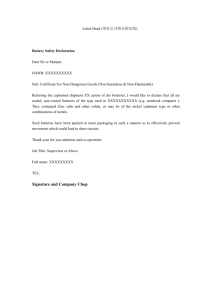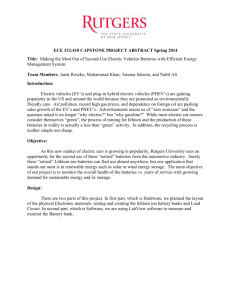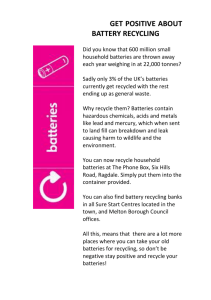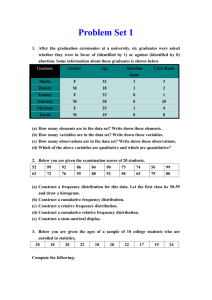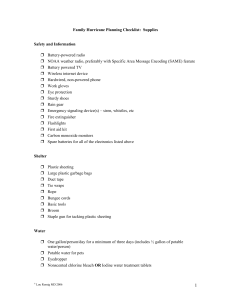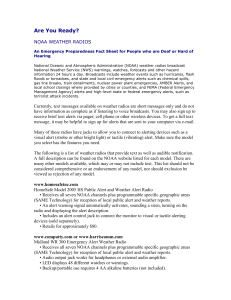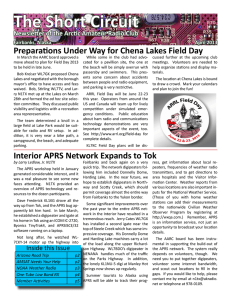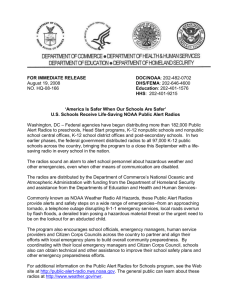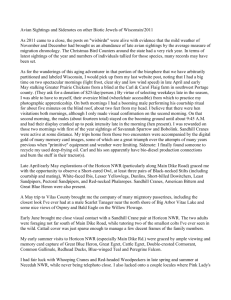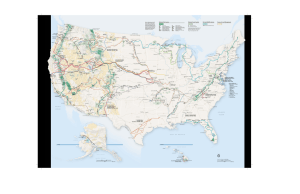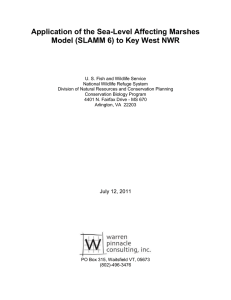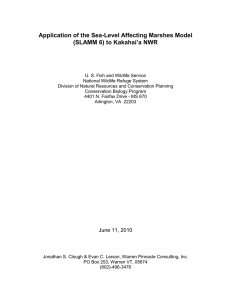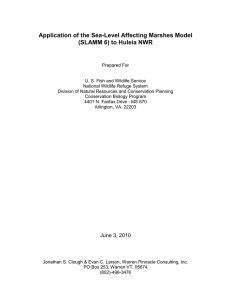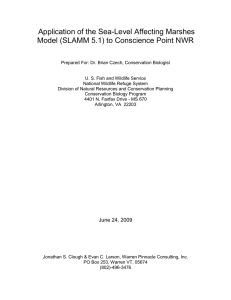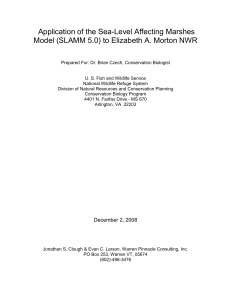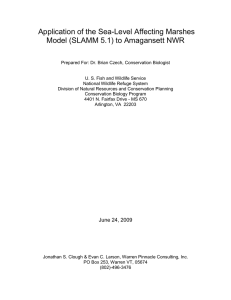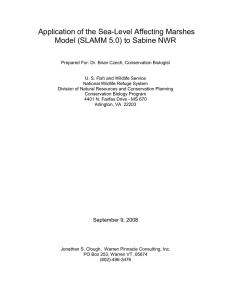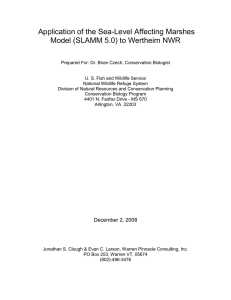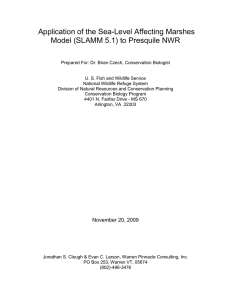When disaster strikes, you may be on your own for hours or even
advertisement
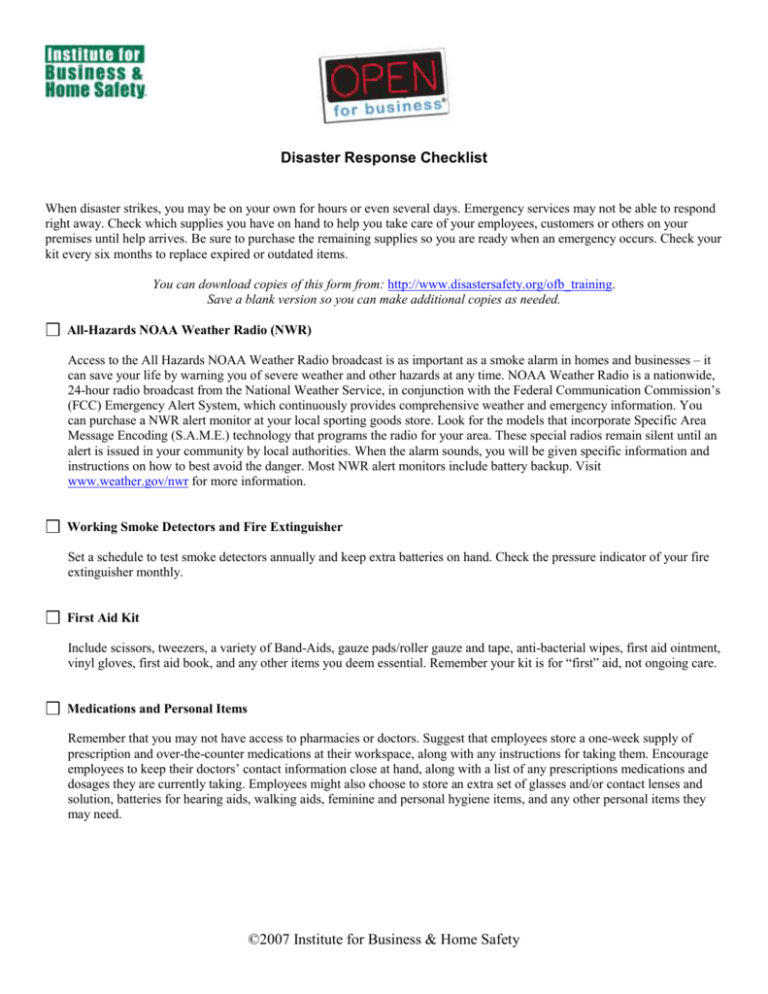
Disaster Response Checklist When disaster strikes, you may be on your own for hours or even several days. Emergency services may not be able to respond right away. Check which supplies you have on hand to help you take care of your employees, customers or others on your premises until help arrives. Be sure to purchase the remaining supplies so you are ready when an emergency occurs. Check your kit every six months to replace expired or outdated items. You can download copies of this form from: http://www.disastersafety.org/ofb_training. Save a blank version so you can make additional copies as needed. All-Hazards NOAA Weather Radio (NWR) Access to the All Hazards NOAA Weather Radio broadcast is as important as a smoke alarm in homes and businesses – it can save your life by warning you of severe weather and other hazards at any time. NOAA Weather Radio is a nationwide, 24-hour radio broadcast from the National Weather Service, in conjunction with the Federal Communication Commission’s (FCC) Emergency Alert System, which continuously provides comprehensive weather and emergency information. You can purchase a NWR alert monitor at your local sporting goods store. Look for the models that incorporate Specific Area Message Encoding (S.A.M.E.) technology that programs the radio for your area. These special radios remain silent until an alert is issued in your community by local authorities. When the alarm sounds, you will be given specific information and instructions on how to best avoid the danger. Most NWR alert monitors include battery backup. Visit www.weather.gov/nwr for more information. Working Smoke Detectors and Fire Extinguisher Set a schedule to test smoke detectors annually and keep extra batteries on hand. Check the pressure indicator of your fire extinguisher monthly. First Aid Kit Include scissors, tweezers, a variety of Band-Aids, gauze pads/roller gauze and tape, anti-bacterial wipes, first aid ointment, vinyl gloves, first aid book, and any other items you deem essential. Remember your kit is for “first” aid, not ongoing care. Medications and Personal Items Remember that you may not have access to pharmacies or doctors. Suggest that employees store a one-week supply of prescription and over-the-counter medications at their workspace, along with any instructions for taking them. Encourage employees to keep their doctors’ contact information close at hand, along with a list of any prescriptions medications and dosages they are currently taking. Employees might also choose to store an extra set of glasses and/or contact lenses and solution, batteries for hearing aids, walking aids, feminine and personal hygiene items, and any other personal items they may need. ©2007 Institute for Business & Home Safety Disaster Response Checklist Flashlights and Light Sticks Keep flashlights and extra batteries in easy to find locations. Non-toxic chemical light sticks can be taped next to light switches for emergency use. Battery Operated or Wind-Up AM/FM Radio Maintain a current list of stations in your area that provide emergency updates and that have generator backup to support continuous broadcast. Keep extra batteries on hand, or consider a wind-up radio (wind one minute for 15 – 35 minutes of play). Bottled Water Have at least one gallon of water per person per day to be used for drinking, personal hygiene, and cooking. Store in sizes that are easily transportable, should you need to relocate. Nonperishable Food and Utensils Stock a supply of non-perishable food such as peanut butter, crackers, ready-to-eat canned meats, fruits and vegetables, comfort/stress food such as cookies and hard candy, canned juices, powdered milk, etc. Be sure to have a manually operated can opener and plastic utensils. Paper Supplies Keep a supply of toilet paper, tissues, paper plates, napkins, and towels on hand. Also have note pads, markers, pens, and pencils. Tools and Other Supplies Keep supplies of items such as duct tape, waterproof plastic sheets, shut-off wrench for water and gas, whistle, compass, plastic bucket with tight lid, work gloves, pliers, hammer, plastic garbage bags and ties. A pry bar, shovel, dust masks, eye protection, and a push broom will aid in clean-up operations. Blankets Keep a supply of blankets, pillows if available, cots or mats for sleeping/taking breaks. Camera Have a disposable camera, or a camera with extra batteries and film, available to record damage. ©2007 Institute for Business & Home Safety Disaster Response Checklist Cash and ATM/Credit Card(s) Keep enough cash for immediate needs, and ATM and credit card(s) for emergency use (dependent on electric power availability). Emergency Contact List Maintain a current emergency contact list for employees and emergency services, such as police, fire, and utility companies. Keep in several places, e.g. a PDA, at home, or a trusted neighboring business. ©2007 Institute for Business & Home Safety
